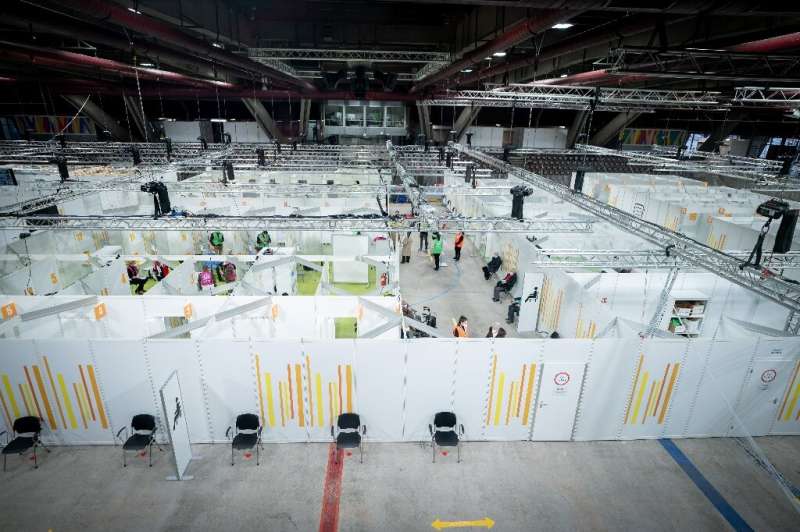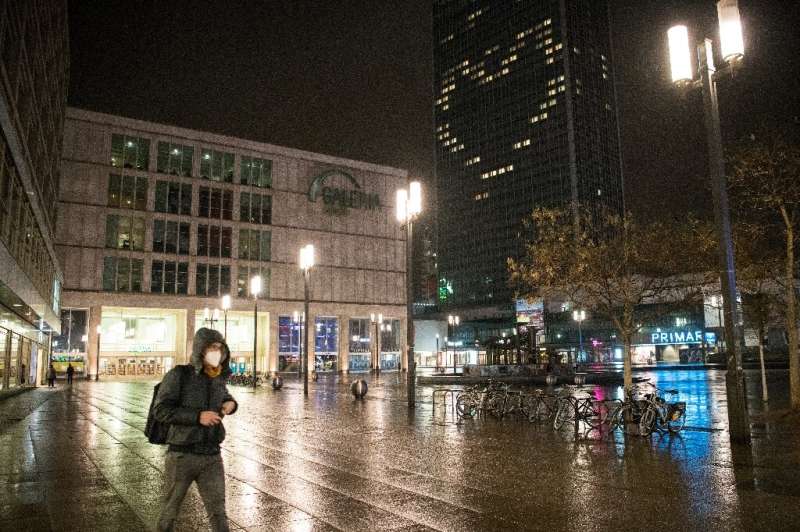Germany poised for tighter shutdown as virus variants fuel fears

Chancellor Angela Merkel and leaders of Germany's 16 states are expected Tuesday to extend and tighten a partial lockdown beyond January, as fears grow over virus variant strains believed to be more contagious.
Draft measures seen by AFP ahead of the emergency talks include prolonging current restrictions until at least mid-February, requiring medical masks on public transport and in shops, and increasing pressure on employers to allow staff to work from home where possible.
Germany shuttered restaurants, leisure and sporting facilities in November, then expanded the shutdown in mid-December to include schools and most shops to halt runaway growth in new coronavirus infections.
The measures ordered until the end of January have brought about a "flattening of the infections curve", Merkel's spokesman Steffen Seibert said, noting also that the number of patients in intensive care had also fallen slightly.
"This trend is cautiously positive, he said, and an achievement of the restrictions of the last weeks.
"But it only brings us to the point where we still have a long way to go before we can say we have the infections under control."
Virus variants first seen in Britain and South Africa also posed major risks, added Seibert.
The crisis talks between Merkel and state premiers were brought forward by a week because of concern over the new strains.
"It is a risk that responsible politicians must take into account—sooner rather than later," he added.

Work from home call
Germany survived the first wave of the coronavirus pandemic relatively well, but a second wave hit Europe's biggest economy hard.
New infections have soared far above the 50 per 100,000 people threshold set by the government. And last Thursday, the country saw a new high in daily deaths with 1,244.
On Tuesday, daily deaths reached 989 though health authorities said they might have been inflated after a lag in weekend reporting. More than 11,000 new cases were recorded.
Seibert noted Monday that the incidence rate was still at over 130 per 100,000 people, and that Germany "must more quickly" bring that down to 50.
President Frank-Walter Steinmeier last week issued a joint appeal with union and employer federation representatives, urging firms to have staff work from home "whenever possible".
More could be done to keep non-essential workers out of the office and off public transport, they said.
Experts have been alarmed by data showing that while a first shutdown last spring had led to a sharp drop of 40 percent in mobility, this winter, far more people appear to be on the move.

Disease control agency Robert Koch Institute and Berlin's Humboldt University used data collected from mobile phone signals to find that last Wednesday, the mobility of Germans was only 15 percent below that from a year ago.
Ahead of Tuesday's talks, Economy Minister Peter Altmaier promised to simplify the procedure for businesses to get aid more quickly to help them cope with the prolonged shutdown.
Germany took on a record 130.5 billion euros ($160 billion) in new borrowing last year to fund its mega bailouts to companies and support schemes for families as the economy crashed due to the pandemic.
RKI chief Lothar Wieler has meanwhile pleaded for rigorous implementation of curbs that have already been ordered, saying that there were too many exceptions allowed.
In northern Germany, authorities were planning to take more drastic measures against people who breach quarantine rules.
Schleswig-Holstein state's justice ministry is turning a youth detention centre into a forced quarantine site for those who do not isolate themselves when required to.
© 2021 AFP


















